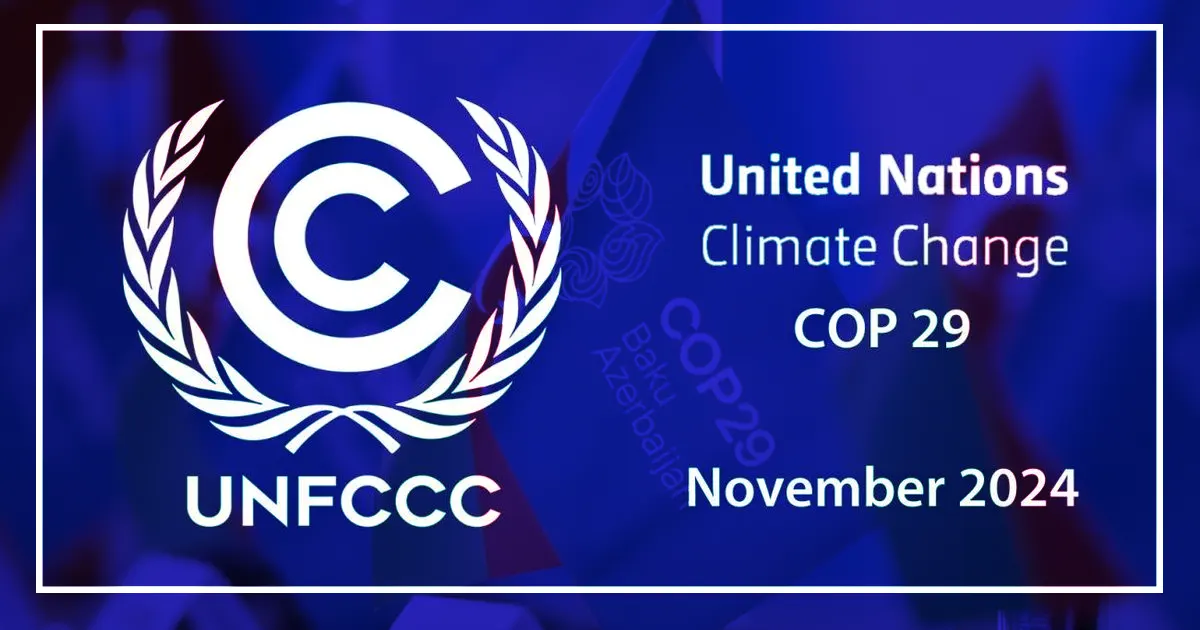GS 3 – ENVIRONMENT

The 29th Conference of the Parties (COP29) concluded in Baku, Azerbaijan, with significant outcomes, including the adoption of the Baku Climate Unity Pact.
About the Conference of the Parties (COP)
- Supreme Decision-Making Body: COP is the primary decision-making platform under the United Nations Framework Convention on Climate Change (UNFCCC).
- First COP: Held in Berlin, Germany, in 1995.
- Annual Meetings: Member countries review progress, negotiate agreements, and set climate action goals.
- Focus Areas: Nationally Determined Contributions (NDCs), emissions inventories, and global climate strategies.
- Next COP: COP30 is scheduled to take place in Belém, Brazil, in November 2025.
Key Outcomes of COP29
- New Collective Quantified Goal on Climate Finance (NCQG):
- Targeted increase in climate finance to assist developing nations.
- USD 300 billion annually by 2035 (tripling the previous USD 100 billion goal).
- Mobilization of USD 1.3 trillion annually from public and private sources by 2035.
- Carbon Markets and Article 6:
- Finalized rules for international carbon trading mechanisms under Article 6 of the Paris Agreement.
- Allows countries to trade carbon credits and finance climate initiatives.
- Transparency:
- Enhanced Transparency Framework (ETF) finalized, ensuring countries report on emissions, mitigation, and adaptation efforts.
- Launched the Baku Declaration on Global Climate Transparency and the Baku Global Climate Transparency Platform to support timely submissions of Biennial Transparency Reports (BTRs).
- Adaptation:
- Introduced the Baku Adaptation Road Map and High-Level Dialogue on Adaptation to strengthen global resilience under Article 7 of the Paris Agreement.
- Established support programs for implementing National Adaptation Plans (NAPs), especially for Least Developed Countries (LDCs).
- Indigenous Peoples and Local Communities:
- Adopted the Baku Workplan, renewing the Facilitative Working Group (FWG) mandate under the Local Communities and Indigenous Peoples Platform (LCIPP).
- Focus areas include knowledge exchange, capacity building, and integrating diverse values into climate policies.
- Gender and Climate Change:
- Extended the Lima Work Programme on Gender and Climate Change for 10 more years to integrate gender considerations into climate policies.
Challenges Highlighted at COP29
- Inadequate Climate Finance:
- The NCQG does not meet the estimated USD 2.3–2.5 trillion annual requirements for emerging markets and developing countries (excluding China).
- Developing nations, including India, rejected the climate finance deal due to its insufficiency.
- Deadlock on Mitigation Work Programme (MWP):
- Divergent views on fossil fuel usage hindered progress.
- Limited Progress on Climate Targets:
- Global greenhouse gas emissions reached a record high in 2023, increasing by 1.3% from 2022 levels (UNEP Emissions Gap Report 2024).
- Nations remain off track to meet the 2030 mitigation pledges.
- Operationalizing Loss and Damage Fund (LDF):
- The fund’s implementation remains slow, with concerns over inadequate funding.
- Other Issues:
- Postponement of new NDC submissions.
- Disparities in per capita emissions and historical contributions.
- Alleged influence of fossil fuel lobbyists.
Way Forward
- Strengthen Climate Diplomacy:
- Enhance dialogue between developed and developing nations to address funding gaps and mitigation concerns.
- Adhere to CBDR-RC:
- Uphold the principle of Common but Differentiated Responsibilities and Respective Capabilities (CBDR-RC) to ensure equitable climate action.
- Operationalize LDF Promptly:
- Expedite funding to assist vulnerable countries in addressing loss and damage.
- Enhance NDCs:
- Increase emissions reduction targets to align with the 1.5°C goal (42% reduction by 2030, 57% by 2035).
- Improve Reporting Mechanisms:
- Strengthen the ETF to hold countries accountable for their commitments.
These measures can ensure COP30 in Belém, Brazil, builds on COP29’s progress to achieve meaningful global climate action.
[box] “Examine the key outcomes of COP29, such as the Baku Climate Unity Pact and advancements in climate finance and carbon markets. Discuss the challenges in achieving equitable climate action and suggest measures to address them.”
[button color=”purple ” size=”medium” link=”https://forms.gle/Wzz7M6oVE4bQS8Ws8″ icon=”” target=”true”]Upload Answer[/button]
[/box]




